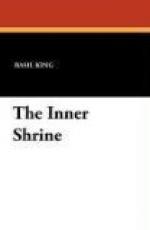holes, but which nevertheless constitutes its saving
grace. Well, in this game of love I—cheated.
I said, one day, that I had won, when I hadn’t
won. I said it to people who welcomed my victory,
not through friendship for me, but from envy of—her.”
The perspiration began to stand in beads upon Bienville’s
forehead, but he held himself erect and went on with
the same outward tranquillity. His eyes were fixed
on Pruyn’s, and Pruyn’s on his, in a gaze
from which even the nearest objects were excluded.
“In the little group in which we lived her position
was peculiar. She was both within our gates and
without them. While she was one of us by birth,
she was a stranger by education and by marriage.
She was admitted with a welcome, and at the same time
with a question. She was a mark for enmity from
the very first. There was something about her
that challenged our institutions. In among our
worn-out passions and moribund ideals she brought
a freshness we resented. She made our prejudices
seem absurd from contrast with her own sanity, and
showed our moral standards to be rotten by the light
of the something clear and virginal in her character.
I can’t tell you how this effect was brought
about, but there were few of us who weren’t aware
of it, as there were few of us who didn’t hate
it. There was but one impulse among us—to
catch her in a fault, to make her no better than ourselves.
The daring of her innocence afforded us many opportunities;
and we made use of them. One man after another
confessed himself defeated. Then came my turn.
I wasn’t merely defeated; I was put to utter
rout, with ridicule and scorn. That was too much
for me. I couldn’t stand it; and—and—I
lied.”
“Oh, Bienville, that will do!” Diane cried
out, in a pleading wail. “Don’t say
any more!”
“I’m not sure that there’s any more
I need to say. The rest can be easily understood.
Every one knows how a man who lies once is obliged
to lie again, and again, and yet again, unless he
frees himself as I do. When I began I thought
I had it in me to go on heroically—but I
hadn’t. I can’t keep it up.
I’m not one of the master villains, who command
respect from force of prowess. I’m a weakling
in evil, as in good, fit neither for God nor for the
devil. But that’s my affair. I needn’t
trouble any one here with what only concerns myself.
It’s too late for me to make everything right
now; but I’ll do what I can before—before—I
mean,” he stammered on, “I’ll write.
I’ll write to the people—there were
only a few of them—to whom I actually used
the words I did. I’ll ask them to correct
the impression I have given. I know they’ll
do it, when they know—”
He stopped helplessly. The lustre died out of
his eyes, and his pallor became sallowness.
“But I’ve said enough,” he began
again, making a tremendous effort to regain his self-mastery.
“You can have no doubt as to my meaning; and
you will be able to fill in anything I may have left
unspoken. Now,” he added, sweeping the
room with a look—“now—I’d
better—go.”




